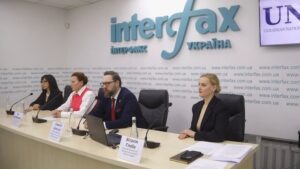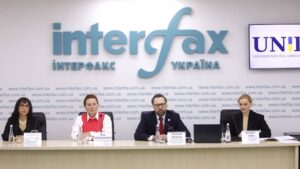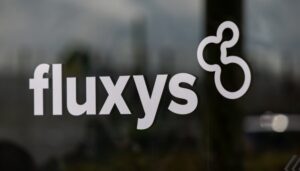
The National Association of Lobbyists of Ukraine (NALU) calls on Viktor Pavlushchik, head of the National Agency for Corruption Prevention (NAZK), to refrain from taking steps that, in the Association’s opinion, could restrict the independence of the lobbying profession and introduce excessive control over their activities.
“We appeal to the head of the NACP, Viktor Pavlushchik, with a public call to stop pressuring the independent profession of lobbyists and to move towards an open dialogue with the professional community. The regulation of lobbying should be based on European standards of transparency, not on manual control of the market by a state body,” said Oleksiy Shevchuk, chairman of the board of the National Association of Lobbyists of Ukraine, at a press conference at the Interfax-Ukraine agency on Wednesday.
According to him, decisions regarding the monitoring and reporting of lobbyists should be made after public consultations with the NALU as a specialized organization.
Yana Tsymbalenko, the NALU’s anti-corruption commissioner, emphasized that the independence of the lobbying profession is an important component of a democratic decision-making system.
“Lobbying is about transparency in representing interests, not about shady deals. Any initiatives by the regulator that could be perceived as pressure on the profession should be discussed openly, taking into account best European practices. We are ready to cooperate with the NACP, but on the basis of partnership, not subordination,” Tsymbalenko stressed.
https://interfax.com.ua/news/press-conference/1121821.html

The National Association of Lobbyists of Ukraine (NALU) has announced the introduction of an anti-corruption officer within its structure, stating its intention to become a model of transparent regulation of the lobbying profession and calling on the National Agency for Corruption Prevention (NAZK) to engage in open dialogue on monitoring the activities of lobbyists.
Oleksiy Shevchuk, Chairman of the Board of the National Association of Lobbyists of Ukraine, announced that the Association is introducing the position of anti-corruption officer in accordance with European approaches to transparency and requirements adopted after the NALU was included in the European Parliament’s Transparency Register.
“The National Association of Lobbyists of Ukraine is introducing an anti-corruption officer, complying with EU requirements and confirming that the profession of lobbyist in Ukraine must be transparent, understandable, and operate exclusively within the legal framework and pay taxes,” Shevchuk said at a press conference at the Interfax-Ukraine agency on Wednesday.
According to him, the NALU is the first public organization in Ukraine to formalize the institution of an anti-corruption officer in the professional community of lobbyists. “No gray schemes, no gray money, no tax-free payments. We are setting an example of how modern lobbying should work—as transparent interaction between business and parliament, not corruption,” the chairman of the board emphasized.
At the same time, Shevchuk criticized the NACP’s approved procedure for monitoring the activities of lobbyists, which, according to him, was adopted without public consultation with the professional community. He considers this approach to be interference by a state body in an independent profession.
“The National Agency for Corruption Prevention is actually trying to establish control over the profession of lobbyists by adopting documents without discussion with the market. Just as the state does not interfere in the work of lawyers, private executors, or notaries, it should not usurp influence over lobbyists. Any accountability mechanisms must be discussed publicly with the professional community,” he stressed.
The head of the NLA emphasized that in the absence of open discussion, the association will appeal to parliament, the government, the Office of the President, and European institutions with a report on the risks of excessive interference by the NACP in the regulation of lobbying.
Lyudmila Kozhura, director of the Vadym Hetman KNEU Law Institute and Doctor of Law, in turn, stressed that for European democracies, systematic interaction between state regulators and lobbyist associations is an established practice.
“If Ukraine is moving towards the European community and adopting the best democratic standards, the state must establish regular dialogue with the National Association of Lobbyists of Ukraine. In the EU, the US, and Canada, regulators systematically hold consultations and discussions with lobbyist associations. This format of cooperation should also be introduced in Ukraine, and we are open to this interaction,” Kozhura stressed.
The anti-corruption commissioner of the NALU is Yana Tsymbalenko, an associate professor at Igor Sikorsky Kyiv Polytechnic Institute, a candidate of sciences in public administration, and an expert in corruption prevention. She noted that any new tools related to the transparent profession of lobbying in Ukraine should be implemented openly.
“Lobbying is not corruption; lobbying is anti-corruption if it is carried out transparently and in the interests of society. The profession of lobbyist requires not only a high level of professionalism, but also a clear understanding of ethical standards and the consequences of decisions made. However, the NACP’s decision to regulate the activities of lobbyists seems premature, to say the least, without broad professional discussion. As the authorized person for corruption prevention, I will ensure maximum transparency in the Association’s activities and prevent any shady practices,” Cymbalenko emphasized.
Executive Director of the National Association of Lobbyists of Ukraine Vitalia Globa reported that the NALU board unanimously supported the introduction of the institution of anti-corruption commissioner and a public appeal to the NACP.
“The National Association of Lobbyists of Ukraine is open to dialogue, cooperation, and professional participation in the preparation of regulations concerning the regulation of the lobbying profession. At the same time, we insist that no decisions regarding the professional activities of lobbyists can be made without the involvement of the relevant association, without professional discussion and transparent procedures,” she added.
Vitalia Globa recalled that earlier, the NALU sent an official notification to the NACP stating that the Association is the first professional organization in the field of lobbying and protecting business interests in Ukraine, brings together leading experts, and is ready to cooperate on regulatory decisions.
NALU representatives also reported that the Association has already developed guidelines on transparency rules for lobbyists and a model contract with businesses, and is preparing educational programs in cooperation with leading universities and international partners. Offline meetings with representatives of lobbying communities in the UK, the US, and EU countries are expected to be held.
The National Association of Lobbyists of Ukraine brings together more than 40 specialists, which is about 40% of the total number of lobbyists registered in the transparency register. The organization calls for an open discussion of the NACP draft document with the involvement of industry representatives, in particular from the fuel, agricultural, energy, and tobacco sectors.
https://interfax.com.ua/news/press-conference/1121804.html

Ukraine’s National Agency for the Prevention of Corruption (NAPC) has added Belgian independent gas system operator Fluxys to its list of international sponsors of war.
According to the NACP press service, the decision was made based on the company’s failure to comply with the UN Guiding Principles on Business and Human Rights and its continued promotion of the export of climate-damaging Russian liquefied natural gas (LNG), which provides financial resources for Russia’s invasion of Ukraine.
“Despite the ongoing full-scale Russian invasion, the Belgian independent gas infrastructure operator Fluxys continues to provide Yamal LNG, a subsidiary of Novatek, with LNG storage and transshipment services at its terminal in Zeebrugge. These services allow for the export of additional Russian revenues for Novatek and tax revenues for the Kremlin regime, which is committing countless war crimes in Ukraine. Thanks to the facts provided by Ukrainian and Belgian civil society organizations, we have found sufficient grounds to add Fluxys to the list of international sponsors of the war,” said Agiya Zagrebelska, Head of the Department for Minimizing Corruption Risks in the NACP’s Sanctions Policy.
The Belgian operator Fluxys provides liquefied natural gas storage and transshipment facilities to Yamal LNG, a joint venture majority owned by the Russian gas company Novatek, which is directly involved in financing military aggression and war crimes in Ukraine. A detailed analysis conducted by the International Institute for Energy Economics and Financial Analysis (IEEFA) in 2022 showed that Fluxys and its shareholders profited by facilitating the export of Russian LNG to the markets of Asia, South America and the Middle East, especially in the winter months of 2021/2022, which exacerbated the European energy crisis and increased profits for Novatek.
“The reputational risks associated with being listed as a sponsor of war and potentially having its credit rating downgraded are not unique to Fluxys. By continuing its involvement in Russian LNG transactions, Fluxys may face the risk of being subject to secondary sanctions from the United States, especially since Novatek is reportedly directly contributing to Russia’s war of aggression, as investigations suggest that the company’s security guards were used to form special military units that took part in the fighting in Ukraine,” said Svitlana Romanko, founder and director of Razom We Stand.
In response to the unprovoked and illegal aggressive war of aggression, many companies ceased all business interaction with Russian partners after February 24, 2022, but Fluxys continued to cooperate with Yaman LNG and Novatek throughout 2022 and into 2023. Experts estimate that Russia expects to receive up to €800 million in tax revenues from exports, which is possible due to the transshipment of LNG in Zeebrugge in 2023. Only 7% of this gas goes to EU markets. Fluxys receives 50 million euros a year for this service under a long-term contract signed in 2015, a year after Russia annexed Crimea and started the war in Donbas.
Novatek, owned by Russian oligarchs Leonid Mikhelson and Gennady Timchenko, is the main supplier of Russian liquefied natural gas to international markets. Mikhelson and Timchenko are members of Russian President Vladimir Putin’s inner circle and, with the help of his regime, have seized stakes in Russian oil and gas projects from international companies. “Novatek is the largest private natural gas producer in Russia. In July 2014, Novatek was added to the sanctions lists of the United States and Canada. In 2016, the US imposed sanctions on several Novatek subsidiaries. On November 2, 2023, the United States imposed sanctions against the Artsyl LNG 2 project, which was intended to double Novatek’s export capacity.
In October, Razom We Stand, on behalf of 23 Ukrainian NGOs, sent an open letter to the Belgian federal government calling on it to take the initiative to impose a complete ban on the transshipment of Russian LNG in all EU harbors, including the Fluxy-operated LNG terminal in Zeebrugge. The Netherlands and the United Kingdom have already introduced such bans.
The main shareholders of Fluxys are Belgian municipalities (77.41%) and the Belgian federal government (3.44%). Both parties have pledged to keep the global temperature rise below 1.5℃ by supporting the Covenant of Mayors and the Paris Agreement, respectively. They also claim to highly respect international humanitarian law, which prohibits intentional attacks on civilians or critical civilian infrastructure. These commitments contradict the actual continuation of cooperation with the Russian company Novotec.

The National Agency for the Prevention of Corruption (NAPC) has added two tobacco market leaders Philip Morris International and Japan Tobacco International to the list of international sponsors of war because of their continued operations in Russia, the agency said.
“The NACP has added two tobacco market leaders Philip Morris International and Japan Tobacco International to the list of international sponsors of war,” the NACP said in a statement on its Telegram channel on Thursday.
According to the financial statements of Philip Morris’ Russian subsidiary, the company’s revenue in the first year of Russia’s full-scale invasion of Ukraine increased by 8% to RUB 140.3 billion, and net profit – to RUB 48.2 billion, which is 45% more than in 2021. “Having confidence in Russia’s economic potential, the company is implementing a large-scale long-term investment program,” the statement said.
“Japan Tobacco International (JTI) is the undisputed leader of the tobacco market in Russia (market share – 34.9%). The company itself has openly stated that the Russian market generated about USD 2 billion. USD in 2022 for the JT Group, or approximately 11% of its consolidated revenue for 2022,” the NACP cites data on the second company’s activities in Russia.
“JTI is the largest investor and leading taxpayer in the Russian tobacco industry. Over the past 20 years, JTI’s investments in the Russian economy have exceeded $4.6 billion. In 2020, the company’s tax payments accounted for 1.4% of the federal budget’s revenue,” the NACP said in a statement.
The NAPC emphasizes that despite the fact that “representatives of both companies have announced their plans to close their business in Russia, stop new investments and marketing activities in Russia, they still continue to manufacture and distribute products in Russia.”